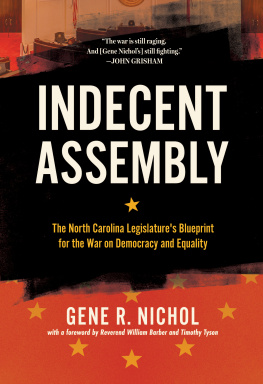This book was published with the assistance of the BLYTHE FAMILY FUND of the University of North Carolina Press.
2018, 2021 Gene R. Nichol
All rights reserved
Designed by Richard Hendel
Set in Utopia, Aller, and Bunday Sans
by Tseng Information Systems, Inc.
The University of North Carolina Press has been a member of the Green Press Initiative since 2003.
ISBN 978-1-4696-6613-6 (pbk.: alk. paper) |
ISBN 978-1-4696-6617-4 (ebook)
The Library of Congress has cataloged the original edition of this book as follows:
Names: Nichol, Gene R., 1951 author.
Title: The faces of poverty in North Carolina : stories from our invisible citizens / Gene R. Nichol.
Description: Chapel Hill : The University of North Carolina Press, [2018] | Includes bibliographical references and index.
Identifiers: LCCN 2018021266 | ISBN 978-1-4696-4652-7 (cloth : alk. paper) | ISBN 978-1-4696-4653-4 (ebook)
Subjects: LCSH: PoorNorth Carolina. | PovertyNorth Carolina. | North CarolinaEconomic conditions21st century. | North CarolinaSocial conditions21st century.
Classification: LCC HC107.N8 N57 2018 | DDC 362.509756dc23
LC record available at https://lccn.loc.gov/2018021266
A PREFACE FROM THE WOODS OF HICKORY
Its hard not to be taken with Hickory, North Carolina, at least on first blush. Nestled in the foothills of the Blue Ridge Mountains, west of North Carolinas urban piedmont, Hickorys 40,000 residents can boast of broad avenues, a quaint city center, impressive museums, welcoming neighborhoods, massive and well-attended churches, a fine private university, tranquil country roads, and an appealing natural environment with endless outdoor recreational opportunities. Sheltering mountains typically produce moderate winters and cooler summers. Prices are modest. Hickory has the look of an older, easier Carolina. Even the name appeals.
Hickory has been repeatedly recognized as an All-American city. The town website notes that Readers Digest designated it one of the ten best places in the country to live and raise a family. Money magazine has posted similar accolades. Forbes praised its decidedly low cost of doing business. Hickory casts itself as the banking, commercial, and medical hub of a 350,000-person metropolitan area famed for its furniture and hosiery industries. More recently, telecommunication powerhouses have helped produce much of the worlds supply of fiber-optic cables. Its hopeful slogan is Life Well Crafted.
Hickory has also, in the last fifteen years, experienced immensely trying economic times.
The pressures and alterations of global trade have hit hard. Furniture and textile jobs, much of the core of Hickorys economy, disappeared with velocity after the North American Free Trade Agreement took hold. The Washington Post would write in 2009 that global trade has overwhelmed this manufacturing (hub) beside the Blue Ridge.
In 2011, a Wall Street publication listed Hickory as one of ten cities that would take more than a decade to recover from the recession.
For the first time, in the last decade homelessness has become a daunting problem in the small North Carolina city. The Salvation Army Shelter of Hope is pressed well beyond its capacity. As a result, some 200 to 250 wounded souls live in the woods surrounding town. They patch together makeshift cardboard lean-tos and dilapidated tents, keeping a wary eye for police and complaining neighbors. Some camp setups are simple, little more than a milk crate for seating and a tarp to fend off the rain. Others string together more intricate, if feeble and often porous, designs. Many campers gather in groups, though the safer course, they indicate, seems to be huddling in smaller, less attention-provoking numbers.
In summer, the camps bear the oppressive markers of the South: intense heat, draining humidity, sudden rainstorms, relentless mosquitoes, yellow jackets, gnats, and snakes. In winter, snow and frost pose distinct and direct dangers. More than one homeless struggler has perished against the cold. About a third of those living out are women. Some are kidsthough their parents, fearing abuse and neglect proceedings at the hands of the state, work hard to hide them. All share conditions and perils that are deplorable. Their circumstances make it hard to remember Hickory is an All-American City and even tougher to recall that the United States is the richest major nation on earth.
Roger Cornett and the fifteen or so volunteers of the Open Door Homeless Relief Projectrun out of the basement of a tiny Baptist church in nearby Conoverspend much of their days and nights, and almost all of their resources, trying to keep people living in the woods of Hickory whole, safe, well, warm, and alive. Cornett is a sixty-four-year-old retired businessman who suffers from the debilitating neuromuscular disorder myasthenia gravis. Some days his illness makes it hard for him to leave the house, or even the bedroom. Particularly on those days, his wife, Janice, works enthusiastically to fill the gap. But on most, Roger Cornett joins early mornings and late nights, tapping a remarkable reservoir of energy and stamina. He doesnt look the part of the heart-on-the-sleeve-do-gooder as he crisscrosses the county in a battered pickup, NRA sticker prominently displayed. But Cornett and his seemingly fearless cohorts venture into often-dangerous campgrounds distributing tents, tarps, food, cookstoves, utensils, propane cylinders, blankets, trash bags, clothing, portable heaters, and even dog food. I never took well to retirement, Cornett explains. I couldnt believe people were being left to live like animals in my own home county.
God calls us to do what we can, Cornett allows; Im no angel. Campers, as Cornett prefers to call those he serves, often refer to him as Chaplain Roger. And the New Testament is never far from his words or thoughts. Still, he explains, Im no Bible thumper. People who live in the woods dont like to be thumped.
As I learned over multiple visits to Hickory from 2012 to 2017, the stories of those living in the camps are tough to hear. A young pregnant woman indicates shes living in a tent until the baby comes. Cornett says he has four pregnant women in the woods now (summer, 2015)we try to help with medicine and transportation to the doctor or the hospital. In an August heat near 100 degrees, before one of my visits the same year, he spends much of a day getting fresh water and an ice cooler to a difficult-to-locate young woman living with two children. A thin man in his thirties, Bill Stock, explains hes been homeless off and on since 2009. A lot of us would be dead out here without Roger and his people. You learn not to look vulnerable, he reports. A woman has to get with a man or shell get hurt.
Making the point, Cornett introduces me to a lesbian couple living along the wood lines. Janet Teal (not her real name) was raped, beaten, and stabbed two days earlier. She shows us thirteen stab wounds. The sight is sickening. Cornett and one of his friends had helped subdue the assailant. I dont know how long well last out here, Teal concedes.










